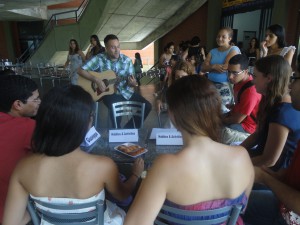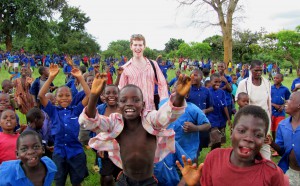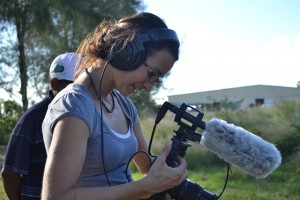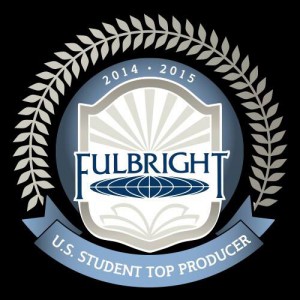
Giuseppe Cespedes, 2011-2012, Fulbright ETA to Brazil (left, with guitar), on his first visit to the Universidade Estadual de Santa Cruz, playing music to his then future students, having a casual conversation (in his initially limited Portuguese), and enjoying some delicious Brazilian pastries
When you are applying for Fulbright U.S. Student Program grant, remember that Fulbright is not solely about assistant teaching English or about doing research; you need to dig deeper. Fulbright was my community in Pontal, a small beach town in the city of Ilhéus, Brazil. It was the place where I made my first group of Brazilian friends, where I learned how to dance forró, and where I practiced capoeira. As a Fulbright English Teaching Assistant, Fulbright placed me at the forefront of my first English class at Universidade Estadual de Santa Cruz, a state university where students from all across the state of Bahia came to attend. My students, pushed by their curiosity, unabashedly asked me questions about my life and my perspectives on Brazilian culture. I tried my best to answer with my limited Portuguese. I was teaching while being taught. My students were my most encouraging Portuguese teachers, and the more we learned from each other, the closer we became as a group.
My students weren’t always the most confident English speakers, so I thought to incorporate music into the classroom to ease the tension. It started off with simple classroom activities, but it quickly spawned into a small choir of dedicated students with different levels of English. The choir met outside of class hours, performed at one of our campus-wide presentations, and we even recorded a few songs at the university recording studio. The choir wasn’t anything fancy or professional, but the students took to it and – if only for a moment – they sang without being consumed by self-awareness of their pronunciation.
Fulbright made me appreciate my own uniqueness, and it brought me into another culture I would have never otherwise experienced. If you want to be tourist, there are several ways to travel, but if you want to grow within a community, then Fulbright might be for you.
Continue Reading





